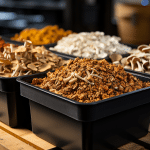Can lion’s mane mushrooms really help you fall asleep faster and improve sleep quality? Research seems to indicate the answer is yes. Let us dive deeper into what the science says about lion’s mane mushroom for sleep.
Intro to Lion’s Mane Mushrooms
Hericium erinaceus, also known as Lions Mane, is a functional mushroom known for its mood-enhancing properties. It has been used for centuries in traditional Chinese medicine, and is still a staple of the diet of health-conscious individuals. This saprotroph is found in abundance throughout Asia, Europe, and North America. The numerous health benefits of Lion’s Mane have intrigued researchers over the past few years, but much remains to be learned about this medicinal mushrooms effects on the body and mind.
Can Lion’s Mane Mushrooms Help You Sleep?
Although further research is needed into lions manes effects on sleep, currently available studies in animals and humans appear to indicate this mushroom may work wonders in aiding good nights rest. While lions mane does not get you drowsy, its stabilizing effects on cortisol levels may encourage easier, restful sleep during bedtime. For instance, according to one 2019 study, supplementing with lions mane improved sleep disorders among patients affected by overweight or obesity. After taking lions mane for 8 weeks, participants reported better mood (lower levels of depression and anxiety) and better quality of sleep.
This study also examined pro-BdNF and circulating BdNF (brain-derived neurotrophic factor) as potential biomarkers responsible for this benefit of lions mane. Lion’s mane has known neurogenic potential, since it promotes neural growth and the production of brain-derived neurotrophic factors. Although levels of BDNF did not increase, those of its precursor, pro-BDNF, did, meaning this neurotrophic factor may have something to do with the lions manes ability to enhance sleep quality.
Lion’s Mane Effects on Stress-Related Sleep Disorders
Lions Mane mushrooms have been shown to support a good nights sleep in times of intense stress, according to a 2015 pilot study. The results are promising, and the results are promising. This study examined the effects of Hericium erinaceus in undergraduate women students during the period of intense examinations. Results showed that Lion Mane was able to decrease anxiety levels of the female participants after 4 weeks use, leading to a general increase in their subjective wellbeing. The participants also reported getting more restful sleep because of the decreased levels of stress.
Does Lion’s Mane Make You Sleepy?
There is a lot of really promising research coming out about the health benefits of mane from the lion, but does it make you sleepy? And are there other side effects as well. In a nutshell: No, Lion’s mane mushroom does not make you sleepy. However, because of its noted benefits for anxiety relief and potential improvements to sleep quality, taking lions mane before you go to sleep as part of your relaxation routine could be a good idea.
Does Lion’s Mane Mushroom Prevent Sleep?
A study published in the Journal of Medicinal Food looked at the effects of Lions Mane Mushroom on sleep quality in adults. The results showed that participants who took a supplement containing Lions Mane Mushroom had improved sleep quality compared to those who took a placebo. So no, lion’s mane does not prevent you from falling asleep.
So it does seem that Lions Mane Mushroom can help improve sleep quality in some people. However, more research is needed to determine the full extent of its benefits for sleep.
What are the Common Causes of Sleep Disorders?
Physical ailments, such as ulcers and chronic illnesses. Medications, including alpha- and beta-blockers, corticosteroids, and SSRI antidepressants. Psychiatric disorders, such as depression and anxiety. Environmental factors, including stress, alcohol, and caffeine. Genetics (e.g., narcolepsy is a genetic sleep disorder). All of these issues can potentially cause sleep disorders.
Most Common Sleep Disorders
- Restless Legs Syndrome (RLS)
- REM Sleep Behavior Disorder (RBD)
- Narcolepsy
- Insomnia
- Sleep Apnea
Negative Effects of Sleep Deprivation
Out of the top five sleep disorders, four lead to different levels of sleep deprivation, either caused by an inability to fall asleep or an inability to achieve sufficient deep sleep throughout the night.
- reduced attention span
- slowed thinking and memory issues
- lack of energy frequent mood changes
- weight loss
- heart palpitations
- increased risk of heart disease
- increased risk of chronic illnesses, such as type 2 diabetes
Adaptogenic Mushrooms and Circadian Rhythms
One of the many adaptogenic properties of medicinal mushrooms, including the herbicium erinaceus, is the ability of them to boost cortisol production throughout the day, thereby stabilizing circadian rhythms.
Does Cortisol Affect the Sleep Cycle?
According to one study published on PubMed Central, adaptogens help stabilize the levels of cortisol, the hormone responsible for feeling alert and awake. This hormone peaks in the morning and declines throughout the day, reaching its lowest level in the evening. A lower level of cortisol allows you to sleep easier at night. However, stress-related issues, a bad diet, and a lack of exercise may lead your cortisol levels to rise later in the day, leading to bad sleep.
Adaptogenic Mushrooms and Cortisol Levels
Adaptogenic mushrooms have a mind-boosting effect, meaning that they may trigger a rise in cortisol levels early in the morning, when taken regularly, and this can be helpful for productivity. Lion’s Mane, for instance, has been shown to have effects on memory and attention when taken in the first part of the day.
Because of an early-morning surge, cortisol levels would be stable throughout the day, dropping just as you are about to go to bed. Therefore, adaptogenic mushrooms like Lion’s Mane, taken in the morning, may be an excellent way to reset circadian rhythms and help maintain healthy sleeping patterns.
What We Can Conclude About Lion’s Mane and Sleep Disorders
Adaptogens, including Hericium erinaceus, have been shown to enhance the circadian rhythm, stabilizing levels of cortisol over a period of days.
According to one study on humans, Lions Mane was capable of improving the REM sleep quality in overweight individuals after eight weeks of use. The potential mechanisms behind Hericium erinaceus effects on sleep may relate to its neurogenetic properties and its ability to stimulate neural growth factors. According to research conducted on undergraduate women students in the examination period, the lions mane can also ease stress-related issues with sleep. More research is needed to fully unravel lions manes mechanisms and beneficial effects on sleep. Given the lack of drawbacks of taking lions mane, its low cost, and high accessibility, it might make sense to incorporate the mushroom into your diet as a means of improving your sleep.
Additional Resources:
Does Lion’s Mane Help With Parkinson’s Disease?
The Best Lion’s Mane Supplements
The Best Lion’s Mane Tinctures
Updated 10/6/2022















